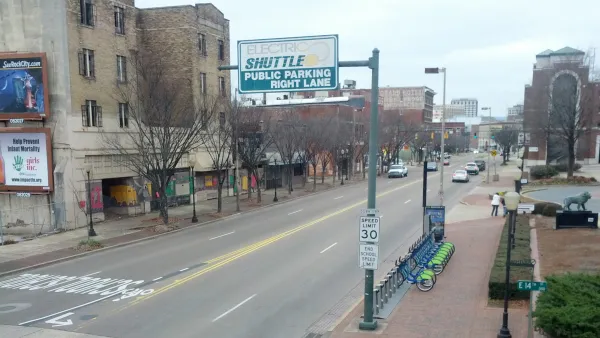Bike share programs are spreading throughout the United States, now in 36 urban areas, up from six four years ago. However, half the programs have encountered technical or financial difficulties, according to a tally by The Wall Street Journal.
Reporting from Chattanooga, where a small but successful two-year-old bike share program [we've posted articles on the Chattanooga Bicycle Transit System here and here] operates, Andrew Tangel of The Wall Street Journal illustrates some of the growing pains in bike share programs here and throughout the country.
The initial funding of $2.1 million (for Bike Chattanooga) has been spent, revenue has fallen short, and the number of yearly memberships sold to frequent riders is about 90% smaller than projected.
One problem cited: "an ample, cheap supply of parking." Parking for cars, that is.
Even the nation's largest program, Citi Bike in New York City, has experienced financial difficulties.
"The business is dominated by a small number of companies, including PBSC Urban Solutions Inc., of Montreal. PBSC sells bikes and technology to many of the biggest programs in the U.S. but filed for bankruptcy in January," writes Tangel.
PBSC's international operations have been purchased by Bruno Rodi. "We're looking forward to the logjam breaking," says Mia Birk, vice president of Alta Bicycle Share Inc., a Portland company that runs bike-share programs using PBSC's system.
Susan Shaheen, a researcher of bike-share programs at the University of California, Berkeley, adds: "The business model is still under development. Some of it is trial and error."
Ryan Rzepecki, chief executive of Social Bicycles Inc., of New York, supplier to eight cities was more straight forward. "The industry is kind of a mess."
Warts and all, programs are spreading. "By the end of next year, there could be as many as 38,000 shared bicycles across the U.S., researchers at Earth Policy Institute estimate," adds Tangel.
Correspondent's note: Link to Wall Street Journal article should be fully accessible to non-subscribers through July 17.
FULL STORY: Bike Shares Spread but Face Uphill Climb

Analysis: Cybertruck Fatality Rate Far Exceeds That of Ford Pinto
The Tesla Cybertruck was recalled seven times last year.

National Parks Layoffs Will Cause Communities to Lose Billions
Thousands of essential park workers were laid off this week, just before the busy spring break season.

Retro-silient?: America’s First “Eco-burb,” The Woodlands Turns 50
A master-planned community north of Houston offers lessons on green infrastructure and resilient design, but falls short of its founder’s lofty affordability and walkability goals.

Test News Post 1
This is a summary

Analysis: Cybertruck Fatality Rate Far Exceeds That of Ford Pinto
The Tesla Cybertruck was recalled seven times last year.

Test News Headline 46
Test for the image on the front page.
Urban Design for Planners 1: Software Tools
This six-course series explores essential urban design concepts using open source software and equips planners with the tools they need to participate fully in the urban design process.
Planning for Universal Design
Learn the tools for implementing Universal Design in planning regulations.
EMC Planning Group, Inc.
Planetizen
Planetizen
Mpact (formerly Rail~Volution)
Great Falls Development Authority, Inc.
HUDs Office of Policy Development and Research
NYU Wagner Graduate School of Public Service


























